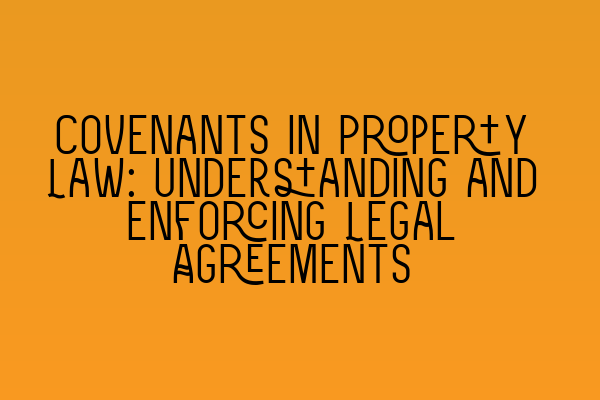Covenants in Property Law: Understanding and Enforcing Legal Agreements
As a property owner or buyer, it is essential to understand the concept of covenants in property law. Covenants are legal agreements that impose certain obligations or restrictions on the use of a property. These agreements can have a significant impact on your rights and responsibilities as a property owner. In this blog post, we will explore the basics of covenants in property law, including their types, enforceability, and implications.
Types of Covenants
There are two main types of covenants in property law: positive covenants and restrictive covenants. Positive covenants require the property owner to perform specific actions, such as maintaining the property or paying certain fees. On the other hand, restrictive covenants restrict the use or development of the property. These can include limitations on building height, restrictions on business activities, or even requirements to maintain a certain aesthetic appearance.
Enforceability of Covenants
The enforceability of covenants can vary depending on the circumstances and the law applicable in the jurisdiction. In some cases, covenants may be enforceable between neighboring property owners, while in others, they may be legally binding on subsequent buyers of the property. It is crucial to consult with a property law solicitor to determine the enforceability of a specific covenant and understand your rights and obligations.
The Implications of Covenants
Covenants can have significant implications for property owners. They can limit the use and enjoyment of the property, requiring owners to obtain consent for certain activities or modifications. For example, if a property is subject to a restrictive covenant prohibiting the construction of additional buildings, the owner may need to seek permission from the covenant holder or apply to the court for a modification or release of the covenant. Failure to comply with a covenant can result in legal action, potentially leading to an injunction or damages.
Enforcing Covenants
Enforcing covenants can be complex, and it often requires the assistance of a property law solicitor with expertise in this area. If you believe that someone has breached a covenant affecting your property, it is essential to gather evidence and seek legal advice promptly. A solicitor can guide you through the enforcement process, which may involve negotiation, alternative dispute resolution methods, or litigation if necessary.
Understanding the implications and enforceability of covenants is crucial for property owners and buyers to make informed decisions. Whether you are considering purchasing a property or are already an owner dealing with covenant-related issues, it is advisable to consult a property law solicitor to ensure you fully understand your rights and obligations.
At SQE Property Law & Land Law, our team of experienced property law solicitors can assist you with all aspects of covenants and help you navigate through any related legal challenges. Contact us today for a consultation to discuss your specific situation and receive expert guidance.
Related Articles:
– Take a look at our SQE 1 Practice Exam Questions for comprehensive preparation.
– Want to get some hands-on experience? Check out our SQE 1 Practice Mocks FLK1 FLK2 to test your knowledge.
– Planning to take the next step? Explore our SQE 2 Preparation Courses for comprehensive exam preparation.
– Need to prepare for SQE 1? Take a look at our SQE 1 Preparation Courses tailored to help you succeed.
– Stay up to date with the latest exam dates and deadlines with our comprehensive SRA SQE Exam Dates guide.
Remember, understanding covenants is vital for property owners to protect their interests and navigate through any legal challenges that may arise. Consult a property law solicitor for professional advice and ensure you are fully informed about the covenants affecting your property.
